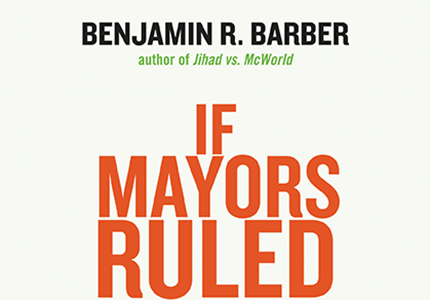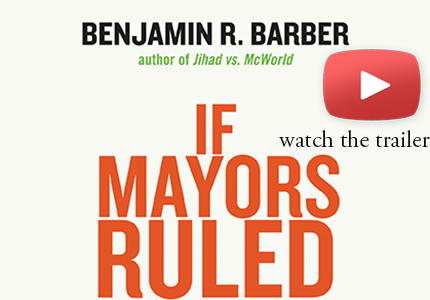If Mayors Ruled the World: A Conversation with Benjamin Barber
 As the government shutdown eases through its thirteenth day, Congress’s’ approval rating has dropped near an all-time-low of 5%. The American people are quickly losing their faith in their federal government as deep party lines prevent progress and decision-making. Benjamin Barber, author of If Mayors Ruled the World, points out that while these federal leaders seem set on gridlock, mayors and their cities continue to flourish and promote democracy. Perhaps, he argues in his new book, mayors and cities provide the key to solving the nation’s interior and international dilemmas. Watch Barber’s TED Talk and check out his interview below!
As the government shutdown eases through its thirteenth day, Congress’s’ approval rating has dropped near an all-time-low of 5%. The American people are quickly losing their faith in their federal government as deep party lines prevent progress and decision-making. Benjamin Barber, author of If Mayors Ruled the World, points out that while these federal leaders seem set on gridlock, mayors and their cities continue to flourish and promote democracy. Perhaps, he argues in his new book, mayors and cities provide the key to solving the nation’s interior and international dilemmas. Watch Barber’s TED Talk and check out his interview below!
Yale University Press: Why are you writing about cities when nation-states have all the power and are creating all the problems?
Benjamin R. Barber: Because it’s time to change the subject: we have been talking about independent nation-states for centuries, but more and more their power counts for little when it comes to the challenges of an interdependent world. The city’s not just where the action needs to be; it’s where the action is. Let’s talk intercity relations, not international relations; a parliament of mayors, not a League of Nations or a United Nations; global citizens, not local special interest consumers.
YUP: The American democratic process seems to be tied up in partisan knots. How can city mayors and their municipal governments do better?
BRB: As Mayor Teddy Kollek of Jerusalem said, mayors don’t give sermons, they fix sewers. They are pragmatists, not ideologues, because in the end someone has to pick up the garbage. They are doing better than national politicians, which is why their trust rates are twice as high.
YUP: Can you give an example of a mayor who has addressed a problem that his or her federal government hasn’t dealt with effectively?
BRB: Ever since Copenhagen, nation-states have been trying to deal with global warming, but sovereignty keeps getting in their way. Cities haven’t waited: Mayor Villaraigosa of Los Angeles has been greening up the port, cutting carbon emissions from freighters and trucks by nearly one-half. Since the port accounts for almost 40 percent of L.A.’s carbon emissions, over five years the city’s carbon pollution is way down.


























